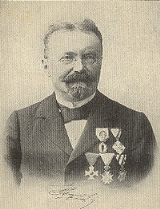
Anton Bezenšek
Encyclopedia
Anton Toma Bezenšek was a Slovene linguist, publicist, shorthand
expert, and lecturer, who spent most of his life in Bulgaria
. He is known as the scholar who adapted the Gabelsberger shorthand
system to the South Slavic languages
.
Bezenšek was born in a small village of Bezenškovo Bukovje
near Frankolovo
, Slovenia, in what was then the Austrian
Duchy of Styria
. He attended the prestigious Celje First Grammar School
high school at the age of 12 and graduated with honours. In 1873 he was elected for a chairman of a school student organization, and learnt the Croatian
adaptation of Gabelsberger Shorthand. Later, he entered the University of Zagreb
, where he studied Greek
, Latin
, and Bulgarian
in the philosophy faculty. As a student, he delivered a shorthand course, which was attended by 236 people in 5 years. After graduating, Bezenšek visited Prague
, Dresden
and Ljubljana
, obtained a teaching permission, and worked in Zagreb
as a chief stenographer in Parliament. In his 1890 biographic notes, he expressed ideas about a common South Slavic shorthand system: "It would be of benefit to the spread of shorthand among South Slavs to establish a South-Slavic Shorthand Union, like the German or Northern Shorthand Union,[...] it should have an agency of its own and should hold an annual congress once in Zagreb, once in Belgrade, once in Sofia, once in Ljubljana."
 Responding to an invitation from the Bulgarian government, and after being recommended by his colleague Spas Vatsov, Bezenšek moved to the recently-formed Kingdom
Responding to an invitation from the Bulgarian government, and after being recommended by his colleague Spas Vatsov, Bezenšek moved to the recently-formed Kingdom
in 1879, and worked as a chief stenographer at the National Assembly in Sofia
. He agreed on a salary, which was lower than what he could have earned for a professorship. On 25 September 1879 he conducted the first shorthand course in Bulgaria.
In 1884 one of the chief stenographer's students reported against him, and Bezenšek was fired from his job at the National Assembly, but instead of accepting proposals for a return to Slovenia and Croatia, he decided to move to Plovdiv
, which was then the capital of Eastern Rumelia
. From 1885 until 1905, he worked in high schools there, introducing Ethics into the curriculum, as well as applying modern methodologies for studying foreign languages — e.g. his New practical manual for easily learning the German language .
Bezenšek moved to Sofia again in 1906, and stayed there till his death. He remained an active scholar, issued a lot of publications and translations, and had been a lecturer at the Sofia University
from 1911.
Shorthand
Shorthand is an abbreviated symbolic writing method that increases speed or brevity of writing as compared to a normal method of writing a language. The process of writing in shorthand is called stenography, from the Greek stenos and graphē or graphie...
expert, and lecturer, who spent most of his life in Bulgaria
Bulgaria
Bulgaria , officially the Republic of Bulgaria , is a parliamentary democracy within a unitary constitutional republic in Southeast Europe. The country borders Romania to the north, Serbia and Macedonia to the west, Greece and Turkey to the south, as well as the Black Sea to the east...
. He is known as the scholar who adapted the Gabelsberger shorthand
Gabelsberger shorthand
Gabelsberger shorthand, named for its creator, is a form of shorthand previously common in Germany and Austria. Created circa 1817 by Franz Xaver Gabelsberger, it was first fully described in the 1834 textbook Anleitung zur deutschen Redezeichenkunst oder Stenographie and became rapidly...
system to the South Slavic languages
South Slavic languages
The South Slavic languages comprise one of three branches of the Slavic languages. There are approximately 30 million speakers, mainly in the Balkans. These are separated geographically from speakers of the other two Slavic branches by a belt of German, Hungarian and Romanian speakers...
.
Bezenšek was born in a small village of Bezenškovo Bukovje
Bezenškovo Bukovje
Bezenškovo Bukovje is a settlement in the Vojnik municipality in eastern Slovenia. It lies in the hills to the east of Frankolovo off the main road from Vojnik towards Slovenske Konjice. The area was traditionally part of the Lower Styria region...
near Frankolovo
Frankolovo
Frankolovo is a settlement in the Municipality of Vojnik in eastern Slovenia. It lies on the main road north of Vojnik towards Slovenske Konjice. The area was traditionally part of the Lower Styria region...
, Slovenia, in what was then the Austrian
Austrian Empire
The Austrian Empire was a modern era successor empire, which was centered on what is today's Austria and which officially lasted from 1804 to 1867. It was followed by the Empire of Austria-Hungary, whose proclamation was a diplomatic move that elevated Hungary's status within the Austrian Empire...
Duchy of Styria
Duchy of Styria
The history of Styria concerns the region roughly corresponding to the modern Austrian state of Styria and the Slovene region of Styria from its settlement by Germans and Slavs in the Dark Ages until the present...
. He attended the prestigious Celje First Grammar School
First Grammar School, Celje
First Grammar School in Celje is a coeducational nondenominational state secondary general education school for students aged between 15 to 19 in Celje, Slovenia. It was the first high school built in the region, established in 1808 by the Austrian Empire. Initially, the language of instruction...
high school at the age of 12 and graduated with honours. In 1873 he was elected for a chairman of a school student organization, and learnt the Croatian
Croatian language
Croatian is the collective name for the standard language and dialects spoken by Croats, principally in Croatia, Bosnia and Herzegovina, the Serbian province of Vojvodina and other neighbouring countries...
adaptation of Gabelsberger Shorthand. Later, he entered the University of Zagreb
University of Zagreb
The University of Zagreb is the biggest Croatian university and the oldest continuously operating university in the area covering Central Europe south of Vienna and all of Southeastern Europe...
, where he studied Greek
Greek language
Greek is an independent branch of the Indo-European family of languages. Native to the southern Balkans, it has the longest documented history of any Indo-European language, spanning 34 centuries of written records. Its writing system has been the Greek alphabet for the majority of its history;...
, Latin
Latin
Latin is an Italic language originally spoken in Latium and Ancient Rome. It, along with most European languages, is a descendant of the ancient Proto-Indo-European language. Although it is considered a dead language, a number of scholars and members of the Christian clergy speak it fluently, and...
, and Bulgarian
Bulgarian language
Bulgarian is an Indo-European language, a member of the Slavic linguistic group.Bulgarian, along with the closely related Macedonian language, demonstrates several linguistic characteristics that set it apart from all other Slavic languages such as the elimination of case declension, the...
in the philosophy faculty. As a student, he delivered a shorthand course, which was attended by 236 people in 5 years. After graduating, Bezenšek visited Prague
Prague
Prague is the capital and largest city of the Czech Republic. Situated in the north-west of the country on the Vltava river, the city is home to about 1.3 million people, while its metropolitan area is estimated to have a population of over 2.3 million...
, Dresden
Dresden
Dresden is the capital city of the Free State of Saxony in Germany. It is situated in a valley on the River Elbe, near the Czech border. The Dresden conurbation is part of the Saxon Triangle metropolitan area....
and Ljubljana
Ljubljana
Ljubljana is the capital of Slovenia and its largest city. It is the centre of the City Municipality of Ljubljana. It is located in the centre of the country in the Ljubljana Basin, and is a mid-sized city of some 270,000 inhabitants...
, obtained a teaching permission, and worked in Zagreb
Zagreb
Zagreb is the capital and the largest city of the Republic of Croatia. It is in the northwest of the country, along the Sava river, at the southern slopes of the Medvednica mountain. Zagreb lies at an elevation of approximately above sea level. According to the last official census, Zagreb's city...
as a chief stenographer in Parliament. In his 1890 biographic notes, he expressed ideas about a common South Slavic shorthand system: "It would be of benefit to the spread of shorthand among South Slavs to establish a South-Slavic Shorthand Union, like the German or Northern Shorthand Union,

Kingdom of Bulgaria
The Kingdom of Bulgaria was established as an independent state when the Principality of Bulgaria, an Ottoman vassal, officially proclaimed itself independent on October 5, 1908 . This move also formalised the annexation of the Ottoman province of Eastern Rumelia, which had been under the control...
in 1879, and worked as a chief stenographer at the National Assembly in Sofia
Sofia
Sofia is the capital and largest city of Bulgaria and the 12th largest city in the European Union with a population of 1.27 million people. It is located in western Bulgaria, at the foot of Mount Vitosha and approximately at the centre of the Balkan Peninsula.Prehistoric settlements were excavated...
. He agreed on a salary, which was lower than what he could have earned for a professorship. On 25 September 1879 he conducted the first shorthand course in Bulgaria.
In 1884 one of the chief stenographer's students reported against him, and Bezenšek was fired from his job at the National Assembly, but instead of accepting proposals for a return to Slovenia and Croatia, he decided to move to Plovdiv
Plovdiv
Plovdiv is the second-largest city in Bulgaria after Sofia with a population of 338,153 inhabitants according to Census 2011. Plovdiv's history spans some 6,000 years, with traces of a Neolithic settlement dating to roughly 4000 BC; it is one of the oldest cities in Europe...
, which was then the capital of Eastern Rumelia
Eastern Rumelia
Eastern Rumelia or Eastern Roumelia was an administratively autonomous province in the Ottoman Empire and Principality of Bulgaria from 1878 to 1908. It was under full Bulgarian control from 1885 on, when it willingly united with the tributary Principality of Bulgaria after a bloodless revolution...
. From 1885 until 1905, he worked in high schools there, introducing Ethics into the curriculum, as well as applying modern methodologies for studying foreign languages — e.g. his New practical manual for easily learning the German language .
Bezenšek moved to Sofia again in 1906, and stayed there till his death. He remained an active scholar, issued a lot of publications and translations, and had been a lecturer at the Sofia University
Sofia University
The St. Clement of Ohrid University of Sofia or Sofia University is the oldest higher education institution in Bulgaria, founded on 1 October 1888...
from 1911.
See also
- Bezenšek ShorthandBezenšek ShorthandBezenšek Shorthand is a shorthand system, used for rapidly recording Bulgarian speech. The system was invented by the Slovene linguist Anton Bezenšek c. 1879. It is based on the Gabelsberger shorthand , so it is often referred to as the Gabelsberger–Bezenšek Shorthand...

